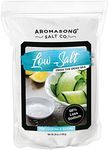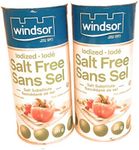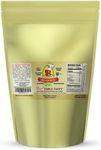Buying Guide for the Best Salt Substitutes
Choosing the right salt substitute can make a big difference in your diet, especially if you are looking to reduce sodium intake for health reasons. Salt substitutes are designed to mimic the taste of regular salt while offering a healthier profile, but not all are created equal. When picking a salt substitute, it's important to consider your health needs, taste preferences, and any medical conditions you may have. Understanding the key features will help you make a choice that fits your lifestyle and dietary requirements.Main IngredientThe main ingredient in a salt substitute determines its flavor and health impact. Most salt substitutes use potassium chloride instead of sodium chloride (regular salt). Potassium chloride can help reduce sodium intake, which is important for people with high blood pressure. However, it can taste slightly bitter or metallic to some people. There are also blends that mix potassium chloride with herbs or other minerals to improve taste. If you have kidney problems or are on certain medications, you should consult your doctor before using potassium-based substitutes. For most people, choosing a substitute with potassium chloride is a good way to lower sodium, but always check with your healthcare provider if you have health concerns.
Sodium ContentSodium content is a key factor because the main reason for using a salt substitute is to reduce sodium intake. Some substitutes are completely sodium-free, while others contain a small amount of sodium mixed with other minerals. If you need to strictly limit sodium, look for products labeled as 'sodium-free.' If you just want to cut back a little, a low-sodium blend might be enough. Your choice should depend on your health goals and any advice from your doctor.
Taste and Flavor ProfileTaste is important because you want your food to be enjoyable. Some salt substitutes can taste bitter or have a metallic aftertaste, especially those high in potassium chloride. Others add herbs, spices, or natural flavors to make the taste more pleasant. If you are sensitive to taste changes, you might want to try a few different types or look for blends with added flavors. Your personal taste preference should guide you here—if you don't like the taste, you probably won't use it regularly.
Intended UseHow you plan to use the salt substitute matters. Some are best for cooking, while others are designed for sprinkling on finished dishes. Certain substitutes may not work well in baking or pickling because they react differently than regular salt. Think about whether you need a substitute for general cooking, table use, or specific recipes, and choose one that matches your needs.
Allergen and Additive InformationSome salt substitutes may contain additives, anti-caking agents, or allergens. If you have allergies or prefer to avoid certain additives, check the ingredient list carefully. There are options available that are free from common allergens and unnecessary chemicals. If you have dietary restrictions, always read the label to ensure the product is safe for you.







